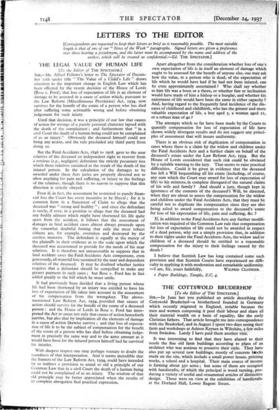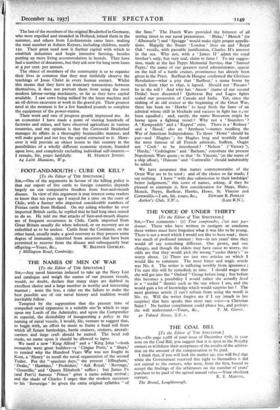THE COTTSWOLD BRUDERHOF
[To the Editor of THE SPECTATOR.]
SIR,—In June last you published an article describing the Cottswold Bruderhof—a brotherhood founded in Germany which recently migrated to England, , notable because the men and women composing it pool their labour and share all their material wealth on a basis of equality, like the early Christian fathers. That article brought me into correspondence with the Bruderhof, and in August I spent two days seeing their farm and workshops at Ashton Keynes in Wiltshire, a few miles from Swindon. Lately I have paid them another visit.
It was interesting to find that they have altered to their needs the fine old farm buildings according to plans of an architect who was anxious to preserve their style. They have also put up several new buildings, mostly of concrete blocks made on the site, which include a small power house, printing works, a school and a hospital. Their main source of income is farming about 35o acres ; but some of them are occupied with handicrafts, of which the principal is wood turning, pro- ducing a variety of useful and ornamental articles of distinctive design. These were on view at the exhibition of handicrafts at the Dorland Hall, Lower Regent Street.
The last of the members of the original Bruderhof in Germany, who were expelled and stranded in Holland, joined them in the summer, and others from Liechtenstein came later, making the total number at Ashton Keynes, including children, nearly iso. Their great need now is further capital with which to establish industries and begin intensive farming, besides putting up more living accommodation in hostels. They have had a number of donations, but they ask now for long term loans at 4 per cent. per annum.
The object of members of the community is so to organise their lives in common that they may faithfully observe the teachings of Jesus Christ in every human contact. Whilst this _means that they have no monetary transactions between themselves,, it does not. prevent them from using the most modern labour-saving machinery, so far as they have capital available. I saw cows being milked by the latest machine and an oil-driven excavator at work in the gravel pit. Their greatest need at the moment is for a few hundred pounds to complete the equipment of the power-station.
Their work and rate of progress greatly impressed me. As an economist I have made a point of visiting hundreds of factories and mines, and have observed agriculture in various countries, and my opinion is that the Cottswold Bruderhof manages its affairs in a thoroughly businesslike manner, and will make good and not lose the capital entrusted to it. More- over it will provide an object lesson to this country in the possibilities of a wholly different economic system, founded upon love, and completely excluding individual self-interest.— I remain, Sir, yours faithfully. H. STANLEY JEVONS. 64 Leith Mansions, W.9. •



































 Previous page
Previous page